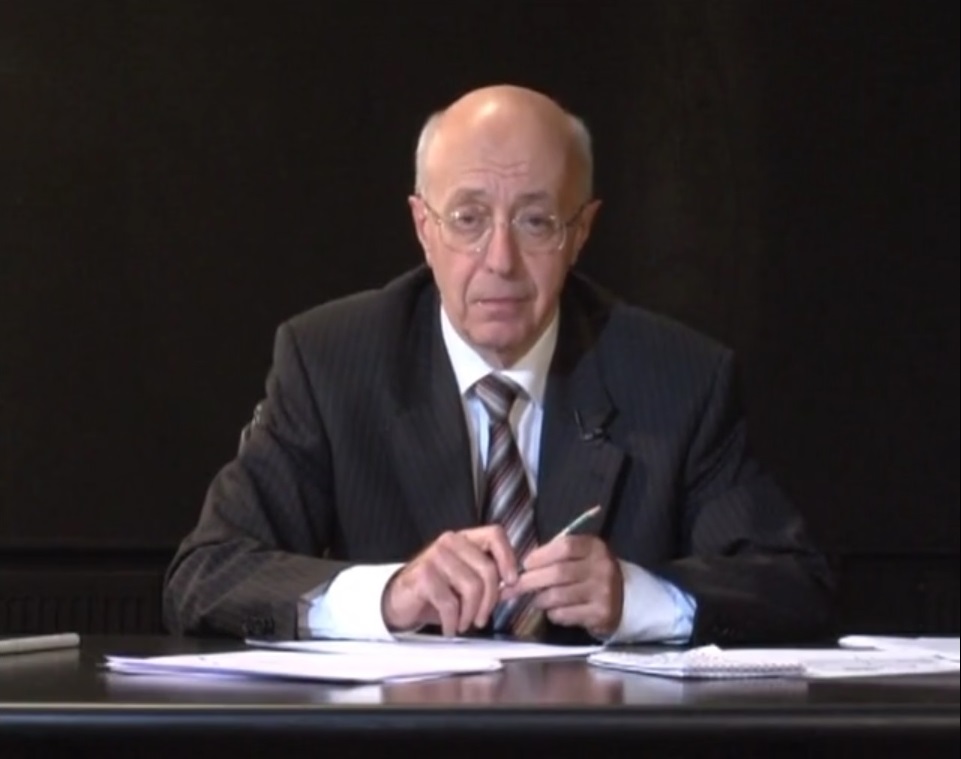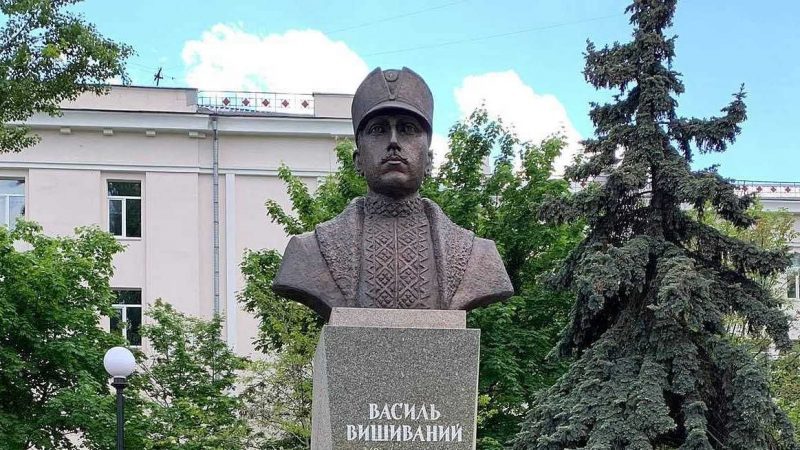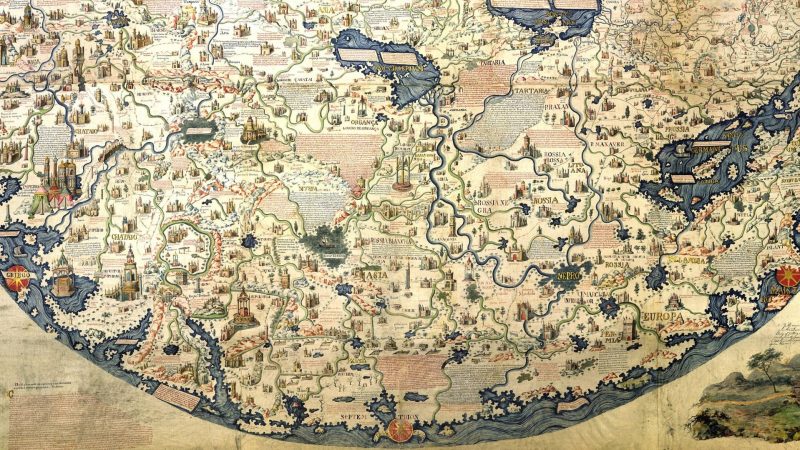February 1, 2011
We have started producing a new internet video broadcast, and we decided to call it “Essence of Time”. Not because the title has an amusing resemblance to “Judgment of Time” [“Essence” is pronounced “soot’” in Russian, while “judgment” is pronounced “sood” – translator’s note], Channel 5’s grand debate show, in which I was an active participant over the course of half a year, but because we do, indeed, want to discuss the ESSENCE of time, the ESSENCE of the era in which we live, its problems, its sore spots, its prospects, as well as the genesis, the origin of the situation in which we all find ourselves. This is the most important. But it is impossible to discuss this in a television show, especially when you are arguing with people of opposing convictions whilst passionately defending your position. One can only discuss this calmly, when you are not afraid of hitting problematic sore spots, when you are looking for the answer together with others in real time, online, as they say, right here, right now.
This new broadcast is not in any way an attempt to continue “Judgment of Time”. “Judgment of Time” is a show, which was made by professionals, with a multitude of cameras, with a routinely applauding audience, and with very competent experts. A participant of a broadcast like that is subject to a rigid time limit. You have to speak compactly, clearly, and energetically, all the while understanding that you are arguing with people whose views on what happened are diametrically opposite from yours, and who will use any means necessary to win in this arena.
What will take place in the “Essence of Time” broadcast will have nothing in common with this. I do not want to repeat the show in an internet version. I want this to not be a show, but to be an ANTI-show. Sooner or later, people will grow sick of shows, especially if we are talking about political events. One must reason in an unhurried fashion, with concentration, insistently searching for the truth, and understanding that you might not immediately find it.
Whether or not this new broadcast will be regular depends on who will need it. The quantity of viewers doesn’t matter. I understand that millions watched “Judgment of Time”, but “Essence of Time” will likely be viewed by a few hundred people. What matters is the quality of these people. What matters is how important they consider the problems to be, which I intend to address. To what degree they see these problems as having a fundamental, or I would say, an existential significance.
By no means do I expect to “hit the bullseye” the first time around. Let us pick the genre together with the people who will watch and listen to the broadcast. Let us discuss whether we ought to act in the form of monologues from “yours truly” or in the form of collective debate. I insist on one thing only: that this debate be between people who are capable of understanding each other, who are capable of bringing their positions together or refining them in the course of the dialogue. That it not be between people who will always put their foot down, and who will be opponents in every situation, who will be “walls” from which any evidence will only bounce off like a tennis ball.
I want to begin “Essence of Time” with figuring out what the essence of our time really is. Conversations about time are a well known and key component not just of historical literature, but also of fiction and philosophical literature. I could also add the New Testament here, because it is here where it is said, “But this is your hour, and the power of darkness”. In a different biblically-themed fictional work about Joseph, whose brothers sell him into slavery, one of the brothers, as I recall, says, “Let us now be totally honest and act according to the times. Let us sell the boy!” I mean Thomas Mann’s work Joseph and His Brothers.
I could also say, “Professor, take off your bicycle glasses! I myself will expound those times and myself”, and that would be Mayakovsky. Then one has to give it the whole nine yards.
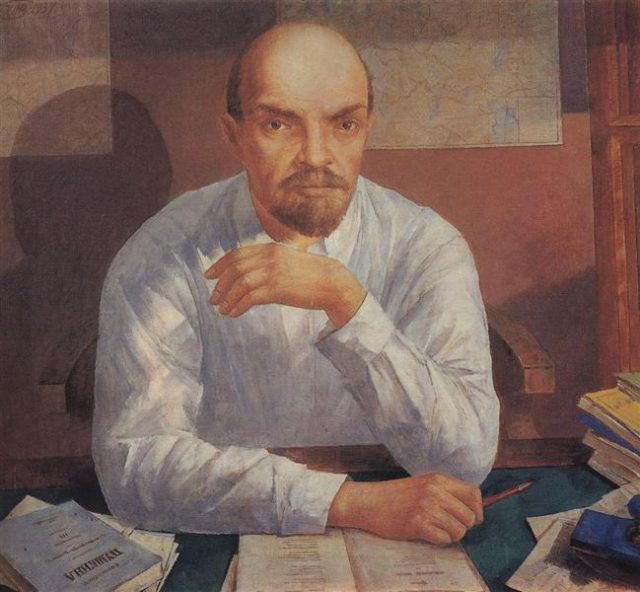
The time has come
I begin
the story of Lenin
Not
because the grief
is on the wane
but because
the bitter anguish
of that moment
Has become
a clear-cut
weighed and fathomed pain
This is the same Mayakovsky.
The list of thoughts and utterances on the subject of time (“Come, Time, let’s have a smoke together”, says Andrei Voznesensky) can be continued. Specialists from different professions have been occupied with the essence of time. Ultimately, the mystery of this very time is also a physical mystery. Kozyrev, the astrophysicist, discussed what active and passive time is. Whether or not time is itself capable of creating something out of itself is a topic that many astrophysicists have discussed. What is time, beginning with the Big Bang, the first ten to the minus twenty-fourth (or minus twenty-fifth) seconds, is being discussed to this very day. There are arguments over its nature, what was it, was that time like the time which exists now? How does time in music differ from regular time? What is the time of perception of a work of art? And so on, and so forth…
There are many aspects which have to do with the problems of time. And ultimately, what is history? It is a process which unfolds in time. If we are discussing history and the meaning of history, we cannot bypass the problem of time. Which, by the way, is intimately related to the problem of the soul in religious and philosophical literature. Time and the soul are related concepts.
But I want to talk about our time, and I want to talk about it from a position which is both philosophical and politically relevant. And so, I wish to discuss, first and foremost, the degree to which the time which we live in is catastrophic. I want to discuss the degree to which the situation in Russia today is catastrophic, and therefore, the prospects and ways to get out of this situation. As well as the fates of those, with whom I am talking, and my own fate, because I personally have no intention of leaving Russia, regardless of what may happen here. So, what happened to the country, and what is that which some refer to as a “revolution of common sense”, a victorious “revolution of democrats” who “brought the country into the mainstream of history”, and which others call a “catastrophe”, a “crime”, and Lord knows what else? Neither one set of references, nor the other, says anything of substance, because what is necessary today is to try to understand what the quality of the situation really is. As I have said time and again in “Judgment of Time”, now is the time neither to condemn, nor to glorify, but to understand.
Let me express my point of view on the matter. It is certainly controversial, and perhaps, it is somewhat complicated, but I cannot articulate it any other way. And unfortunately, I don’t think I have seen any other articulations, which prescribe (even in a complicated way) how to act based on what has happened. It is impossible to separate “what happened?” from “how must we act?” and “how can we overcome what happened?” It is just like one cannot separate diagnosing a disease from formulating a treatment plan. Of course, the disease could turn out to be incurable; but even in this case, strong-willed and courageous people go all the way and treat the patient, even when there is no chance for success. And as the experience of this type of medicine tells us, sometimes they are successful, and a miracle happens. I for one do not view this as a miracle, but as a supreme concentration of willpower, intellect, the desire to achieve a result regardless of anything, and the talent of the person who achieves this result.
So what happened to the country, how do I understand what happened, everything that Putin, as the President, called a “geopolitical catastrophe”? I talked about this in my book, Esau and Jacob, in a multitude of articles, in my presentations at the Substantive Unity club, in my appearances on television and radio. I have said many times that, from my point of view, “geopolitical catastrophe” is an insufficient definition. Of course, a geopolitical catastrophe – the breakup of the USSR – did happen; but before it and parallel with it, another catastrophe happened, which was much more important to the people of the country. I call it a metaphysical catastrophe, or the fall. I will try, apologizing in advance for a certain complexity, to explain what I mean by a metaphysical catastrophe, especially for those who, like yours truly, are not immersed in religion. I consider myself as somebody, how could I say this… who has a certain metaphysical dimension, but at the same time as someone quite secular.
So, what happened, after all?
In discussing this, we cannot help but give an insight into Man, into human society. We have to first agree (and this is obvious for all) that regardless of who Man is, the secret of Man is great, and it will keep being investigated for as long as Man exists; and probably, it will remain incompletely understood up to that time. We all understand, regardless, that Man is not a beast. It is not just because he has reason that he is not a beast. He has something else. Some call it a soul; others say that he has a superconsciousness, or something else, some sort of capability to orient one’s self to meaning.
Either way, Man belongs not only to nature, even though he does also belong to nature, among other things. Like a beast, he eats, sleeps, drinks, produces offspring, defends his territory, competes with others like him, forms communities with some people (which in the language of beasts is called a pack), and so on, and so forth. He is in many ways like a beast, but he is not equal to it; they are not the same. He is qualitatively different. The difference between Man and beast is as great as the difference between culture and nature. Man creates his social world, his environment in which he lives.
Within this difference between Man and nature a certain duality, or binarity arises. Man is, in one sense, a beast, and in another sense, he is something different. In the sense in which he is a beast, he has physical needs, to a degree psychophysiological, and others. In the sense that he is something different, he has higher motives; he reacts to meaning; he lives in the world of values; he has an understanding of honor, duty, and many other things.
One can give this different names. One can simply remain with the definitions which I am giving right now, and this will be entirely sufficient. But I would like, and I have no regrets about this, to address biblical themes here, and to say that everything in terms of which Man is a beast, everything associated with him which is material, animalistic, elementary can be called “lentil pottage”. And, everything in Man that is above this, the sublime, the ideal, the spiritual, everything which longs for something other than a swinish and beastly existence: this all is “birthright”.
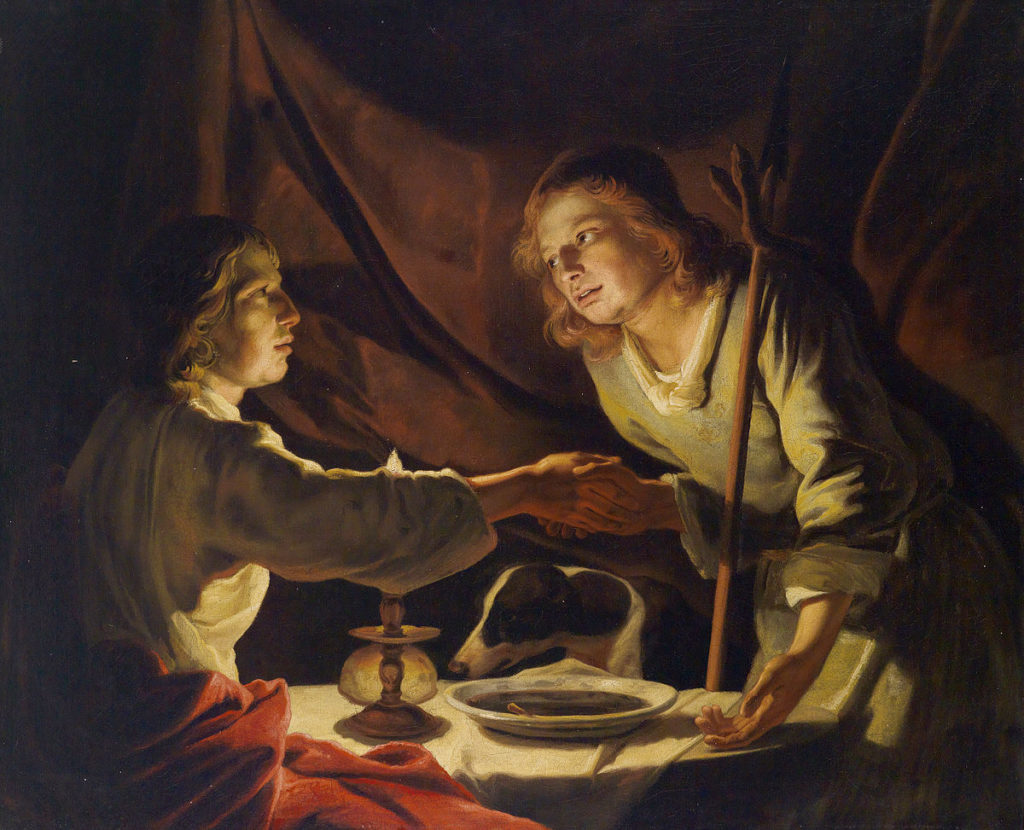
I use these terms (or these symbols, metaphors, these labels) figuratively, and I ask that it not be demanded of me that I immerse myself deeply in biblical themes, that I ponder over how the tribe of Jacob differs from the tribe of Esau, and what happened in reality between Jacob and Esau, in what sense Jacob committed fraud by trading lentil pottage for the birthright… In this situation, I don’t care about this at all. I love these themes very much, and I could discuss them endlessly, but now they are not important. If you want, you can call it “the High and the Low”, or call “the birthright and lentil pottage”, but the important thing is that Man is binary; he contains both one and the other. Those who destroyed the Soviet Union sent two main messages to our society, which for some reason was ready for this.
Message #1 said, “You know what, your birthright is so rotten that nothing can compare! Stalin killed tens of millions of people, almost a hundred million people. Every day they murdered you, ate you alive, humiliated you, stomped you with their feet, made deals with Hitler, did monstrous things; there is not a single living molecule of honor and conscience in your history. And if you keep hanging on to this birthright, then you are insane.”
This was the first message. And while “Judgment of Time” aired, I came to understand very well how it was organized. This is rather amusing, and I think there is something here to ponder about.
The Americans, not being fools, made an order to their average, mentally competent, not particularly talented, but sufficiently thorough researchers to conduct ideologically oriented investigations into every episode of our Soviet history. This meant the Stakhanov movement, the beginning of the war, collectivization, anything and everything! This was a wide spectrum of decently funded research, which the researchers conducted with a measure of thoroughness and a measure of bias, since they were being paid to be biased. They were supposed to stomp every molecule of our history into the ground. They were supposed to discredit our history in a reasonably convincing manner on the basis of factual evidence. They carried this out, and their results ended up on bookshelves. If they would have stayed on the bookshelves, nothing would have happened. In essence, Soviet researchers did similar work on American imperialism, subjecting it to a barrage of criticism.
However, the American research did not stay on the bookshelf. It found its way into our special repositories; it was translated into Russian, and… it began to be utilized under the designation “for service use only”, in small batches, or otherwise, that depended on who the authors were: Cohen, Conquest, Brzezinski… All of this existed for a certain circle, whose duty it was to familiarize themselves with bourgeois theories and with how they went about trying to discredit us, so as to wage better ideological and informational warfare. There was a sort “closet opposition” among these people. In other words, these were people in uniform with the corresponding security clearances and considerable political clout, but who had been quite skeptical of Soviet history and Soviet society for a long time. I’m not saying that our history and our society didn’t give a certain basis to this, but right now this is beside the point.
And so, there were people like this, and I call them “closet opposition”. They were “closet opposition” in uniform or “closet opposition” with a certain social standing. And, they read all of this. I won’t say that they made photocopies; but one way or another, they let their dissident friends get acquainted with it. And sooner or later, the aforementioned literature, translated into Russian mostly by our people and delivered here, also mostly by our people, became the domain of the dissident kitchens, where it was discussed for decades by people who, for one reason or another, had severed all ties with Soviet society. I will not go into detail as to what extent their reasons were deep or shallow, to what extent they were mercantile or idealistic; they were different. To say briefly, these people severed all contact with their society according to the well-known joke when a dissident posts a classified ad in the newspaper: “Missing dog, bitch… (next comes a profanity)… How I hate this country!”
The dissidents who gathered in these kitchens could be “off the grid” and be persecuted by the authorities, or they could lead a rather comfortable existence; either way, they spent a long time discussing all of this. They discussed it in detail, meticulously, accumulating the poison of hatred, learning from these books, memorizing everything that the books said, mostly, facts, facts, and more facts, which they considered to be deadly and irrefutable. This is how our homegrown dissident-closet opposition discourse gradually came into being. In other words, a certain volume of literature pertaining to every piece of history, which was discussed and articulated in rather narrow circles. They could have kept articulating it until the Second Coming, and nothing would have happened.

But the following happened. As soon as perestroika began, the few high-ranking party official who conceived it (in essence, one person, Alexander Nikolayevich Yakovlev) carried out the following maneuver. They connected the dissidents, who were already permeated with the poison, who had a developed content and discourse (because all of this knowledge wasn’t just memorized, it was articulated as a certain set of ideological constructs, as a certain set of mental constructions). All of these people who had spent their time educating themselves and honing their ferociousness and their argumentativeness in the dissident kitchens, were connected with the mass media, which at that time was under the unopposed control of the ruling party. First and foremost, with television, but not only. In this way, they allowed the dissidents to pour all of their poison out onto the society, all of this poison they accumulated which, again, was prepared according to the following principle: First there was American research. Then it was translated and stored in special repositories. Then it was discussed in the dissident kitchens, where it was worked through in detail, a discourse was formed; and finally, the hour had come – charge!
Was this situation mortally dangerous, so dangerous that society was doomed? By no means. All that had to be done was to allow a normal democratic discussion, and to give people with a different idea about the process, and most importantly, people who knew how to talk and argue, the opportunity to argue their position. Then, quite possibly, the Soviet Union would have been saved, and the people would not have gone crazy to the degree that they did. The lid would not have been flipped to such a degree. The blow would not have been so strong. It would not have taken the nature of a cognitive shock, the nature of a wide-spanning sociocultural trauma. Not of an individual trauma, even though the individual component is there, but of a collective, social, a national trauma, call it what you will.
But these other people were not allowed to speak. Or, they were allowed to speak in places from which they would not be heard. Or, their place was taken by such opponents, who a priori could only discredit the idea of arguing with such wonderful, intelligent, and educated opponents, as were the dissidents who Yakovlev brought into the TV and into the most popular newspapers (the mass media at the time, I reiterate, were under full control of the ruling party).
And so, the blow was horribly strong! There were no defenses put up against this blow. Moreover, the fact that debates at this stage were a dead end was obvious from the beginning. On one side, there were people who had knowledge, or what they believed to be knowledge, a discourse, a collection of fact and arguments, “Here is how it was in reality, here are the archives, here are the data, here are the facts”, and so on. On the other side were people who said, “You mudslingers! Don’t you dare touch our Soviet myth, our wonderful legend about the country and society!”
Had our society been a traditional one, and had it defended its myth like Catholics in some 17th century defended the myth of the Immaculate Conception… in other words, if the response to any sacrilege was a physical blow, or let’s say drawing one’s sword; then perhaps, nothing scary would have happened. But our society was already modernized and contemporary; it did not sacralize its myths, and it was not ready to defend them in such a way. It wanted truth, not myths. As soon as supporters of the Soviet Union and Soviet society started saying that we have sacred things and myths, their opponents said, “Wait just one minute, maybe everything was indeed vile, and maybe you’re just lying? Maybe it’s an empty ideological label?” and so on and so forth.
In this way, a colossal, irreparable, and fantastically crushing defeat occurred, which evidently began in 1986, or at the end of 1986 and the beginning of 1987, and it came to completion in 1990-1991. It was a brief period which defined a substantial part of our history. This is because widest segments of society were able to be convinced in that time that their birthright was rotten and spoiled! And, these segments agreed with this. Segments of our society, our compatriots. I saw this; I am a witness; I participated at that time in debates of various “hot-lines”, on Moscow television, on various open forums. I saw people with eyes full of madness, who had already ingested a dose of that dissident poison, and who were going crazy from the anger, the hate, the disenchantment, from the feeling that they were deceived so much, that they were lied to all these years, and from “how things were really like”.
In defense of my compatriots, I have to say that they were hit very hard. They were hit unprecedentedly hard. This happened, I repeat, because of the monopoly of the ruling party, which of course should be blamed for everything first, because the one with the power is the one to blame. But if there had been a free and egalitarian discussion, which that same ruling party never allowed… If all of this happened in the normal, democratic forms of full-bodied and equally-weighted discussion, then perhaps our compatriots would not have been so severely traumatized.
But it was how it was. In this sense, there is no “what if?” in history. It already happened! The consciousness was shattered! By this terrible strike, by this first message…
But there was a second message, which was no less important. This message #2 boiled down to, “Why do you even need a birthright?! You only live once! We live in the here and the now, so let us live! Where do all these raving come from that we need some sort of ideals, that we need sacrifice, that we have to live by some sort of meaning? That’s not what we live by!”
In the late ‘80-s, very many publications came out, where ideals were discredited as such. Profoundly, and by any possible means. The question was not about Soviet ideals; it was about ideals as such! The American Dream cannot be canceled. It always exists, like the American Mission, and many other things. But, the Russians were told that not mission, nor any dream should exist at all. Not only the Soviet one which was “false, corrupt, terrible and disgusting”; no dream of any sort should exist! People should live for their interests, in other words for “lentil pottage”. Erich Fromm called it “goulash”, but I like the term “lentil pottage” better.
Both of these messages found their way into the consciousness of our compatriots, a great multitude of our compatriots, and they ended up rejecting their birthright. Moreover, in 1990, 1991, and even in 1992, one could say that they rejected it in the name of democracy, freedom, the rule of law, etc. In other words, in the name of a different ideal, which is acceptable in principle. Ultimately, what was the Revolution of 1917? One ideal, the Orthodox empire (the cross over the Hagia Sophia, the Orthodox symphony, and so on) was exchanged for a different ideal, communism. The exchange of ideal for ideal is a type of barter, a type of replacement.
That is what History is. Every time it hangs over the abyss, because every time the downfall of one ideal severely traumatizes the society; but immediately, another ideal replaces the previous ideal, and something becomes reestablished.
By 1993, it became clear that a significant portion of our compatriots had supported Yeltsin. Even after understanding that they had been deceived. Even having the “White House” [the popular name of the Supreme Soviet building of the Russian Federation – translator’s note] as a symbol, from which all of the flags, including the red one, were raised. Even knowing that Yeltsin had violated the Constitution by that time, and that he released the Presidential Decree #1400 which was patently illegal, they still did not support the other side. Some cited the presence of the “unpleasant Chechen Khasbulatov”, which was utter nonsense, because it wasn’t Khasbulatov who had the authority, but the Supreme Soviet, which was elected by these very same people, who could ultimately vote them out of office afterwards, and the majority in which was made up of people of very different convictions, including non-communist patriots as well as partially communist ones. Therefore, all of these references to Khasbulatov do not hold water.
The people simply believed Yeltsin’s promise to lie down on the railroad tracks if the market and his reforms do not fill the feeding trough with very tasty lentil pottage. That this pottage would be much tastier than the pottage offered by the Soviet system, which was in many ways indeed ascetic and meager. In believing this, the people concluded, formatted, and outlined the stage called the metaphysical fall. Exchanging one’s birthright for lentil pottage is exactly this kind of metaphysical fall.
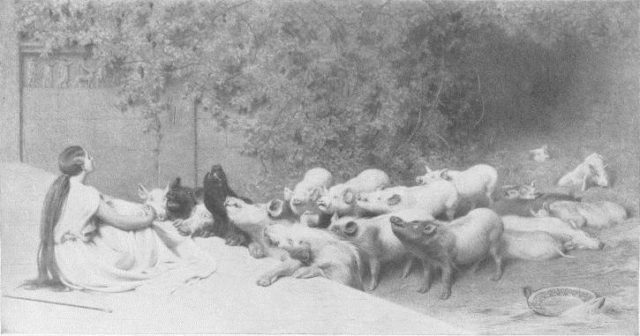
I must say that the intelligentsia which participated in this (and it didn’t just participate, it practically drove the people in this direction) did something monstrous. Onto message #1, according to which the Soviet birthright is rotten, it actually added message #2, according to which all ideals are garbage.
No society if it wishes to exist, and no authority if it wishes to govern ever saws off the branch it is sitting on. They do not destroy the ideal as such. In destroying some historically defined Ideal, be it Soviet or pre-Soviet, they quickly put a different Ideal in its place. Lenin suffered over the questions of what heritage we renounce and what heritage we do not renounce, because he understood that one cannot just reject everything, for then there would be no place to introduce one’s new ideals. They will not take, and if they do not take immediately, if no new ideal content can emerge, then one cannot govern the society, there can be no authority, there can be no legitimacy, there can be nothing! There is only a disoriented and helpless half-beast herd, which is not capable of being a support for any authority.
From this standpoint, the intelligentsia committed two crimes. First of all, it indiscriminately denounced what it did not understand (I mean Soviet society). Second of all, it discredited the Ideal in general. In discrediting it, the intelligentsia also deprived itself of a future, because it became unnecessary. The intelligentsia was the priest of the ideal. If it rejects the ideal, then why does anybody need it? The authorities were also doomed to a pathetic and wretched existence, because it is impossible to rely on society for support without the Ideal. One can only float with it down some sort of terrifying current. It isn’t even the River Styx. It is an endlessly foul and repugnant little river which gradually makes its way into some sort of irrigation fields. These are not even the fields of Hades or Elysium. No, it flows into something much more terrifying and humiliating. And, all one can do is float down this current, making some temporizing maneuvers. This is what was done.
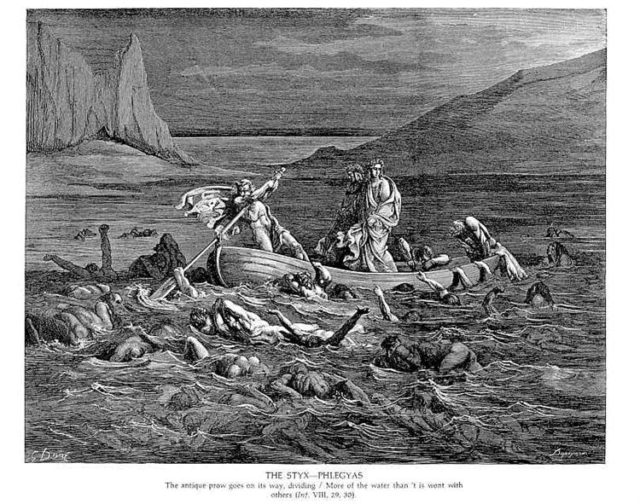
This was completely finished in 1993. I cannot call 1991 the ultimate milestone simply because of the existence of the ambiguous Gorbachev factor, the disorientation, unclear prospects for the future, the partial illegality of the actions of the State Committee on the State of Emergency [the attempted coup against Gorbachev between August 19 and August 22, 1991 – translator’s note], and many other things. There was a lack clarity. In 1993, things were perfectly clear, but no 500,000 people came to the “White House”, not even 300,000 people, but 40-50,000, regardless of conflicting accounts.
People watched the shelling of the “White House” rather cold-bloodedly. After this shelling, everything became stomped into dirt: rule of law in its democratic sense, democratic elections in its authentic sense, which could somehow be associated with freedom, and freedom is the greatest of values. It was already clear that everything was done, so that certain people could become wealthy; and afterwards, this particular kind of capitalism could develop. Moreover, this all was not done for the sake of capitalism as such, because by that time nobody considered capitalism as something ideal. Let me stress: the Ideal had collapsed! It was done for the sake of certain specific gains of a material nature. For the sake of a greater “prosperity”, for the sake of a larger quantity of lentil pottage in the feeding trough. By throwing away their birthright, the people committed a metaphysical fall, thus concluding the first stage of their mystery.
But a second stage emerged. The stage of reckoning. Because when you sell your birthright for lentil pottage, then slowly or quickly, but the lentil pottage itself starts disappearing. This is how the prince of this world acts… The master of the hour of darkness. This is where his essence is. This is how he deals with those who reject the Ideal.
Why then did the people think that, one way or another, they would receive more lentil pottage? If, let’s say, Soviet society gave a certain X amount of pottage, then why did the people think that there would be more of it?
People who do not identify with religious terminology can call what I refer to here as a metaphysical fall by the names of regress, dumping, a sociocultural fall, or an involution. All of these words are devoid of a strictly religious meaning; they have a different meaning, which is very similar. This is if one is definitely sure that the essence is in fact that the rejection of the Ideal is a breakdown, that it is a catastrophe that generates a regressive process. I am sure of this. I see it every day, and I can’t base all of my prognostication, assessments, and recommendations on anything other than what I see.
I would be extremely happy to be mistaken. I would be very happy if the process is not so adverse in nature. Because, all I want is to live in a country that is not transforming in front of my eyes into the site of one of the most significant catastrophes of the 21st century, to live together with other people, and to work with them. I would be quite content with putting on theater productions and using them to bring joy to viewers. If I could, along with this, publish journals, talk to people through mass media, and so on, then this would be an absolutely fulfilling life, and I don’t need any other kind of life. The problem, simply, is that this catastrophe will inevitably roll over me just like over all of the other people, and the only thing I want is to escape it. But if I see how everything is leading up to this catastrophe, then I can’t just close my eyes and say, “No, no, this is not a catastrophe, not a dumping, not a regress. It’s something completely different, like the plotting of the mafia, or the intrigues of the CIA, and nothing more.”
I am not saying that the CIA did not participate in the processes taking place here, and I am not saying that the mafia did not partially seize power, thus transforming itself into something different and much scarier than a mafia. We do not have a mafia or corruption in the usual sense of the word; we have new forms of sociopolitical organization of our entire society. Of course, all of this exists, but this is not the final diagnosis. These are components of what had unfolded. The essence, the nucleus of it all, from my point of view, is the metaphysical catastrophe of the fall. When it happened, the first part of the mystery came to its completion. The regress began.
But the people firmly believed that now they would receive something in return, and it was important for them to understand what they would receive. What they would receive in place of an X amount of Soviet consumption, which was humble, meager, and not devoid of being degrading (in terms of standing in lines, etc.). They were supposed to receive more than just X. At the expense of what?
That which is unfolding, which for someone who thinks in spiritual terms represents a metaphysical fall, can be called a “regress”, “dumping” or an “involution”. Now, in the process of involution, an individual who has started down the path of involution and regress, or a community which has started down this path, a macro-community called a “nation”, a “society”, etc., any such community or individual, having started down this trajectory, thinks of its gains in terms of ridding itself of encumbrances. Ultimately, in the setting of a very profound involution, anything can become an encumbrance. A sick or even a healthy child, a sick or even a healthy wife, anything! An elderly father, and elderly mother, anything! At the extreme, it could be anything, if one has begun to fall, if he has started on the path of involution.
People were thinking in terms of disencumbering themselves to a certain limited extent.
The first thing that they wanted put an end to, and this was considered very reasonable, was to stop “feeding” so-called fraternal countries, like Cuba, Angola, or for example, the Warsaw Pact countries. The notorious saying “Si to Cuba, no to meat” jumped off the tongues not only of dissidents, but of people who were just generally skeptical of what was happening. “Now”, said the people, “since we are no longer building communism across the entire world, in other words, since we have sold our birthright, let us stop feeding Cuba, Angola, the COMECON, and so on, and we will receive a certain Y on top of our X. Since we have rid ourselves of this encumbrance, we can direct all of the resources we have thus freed towards consumption. And, we will have more consumption! X+Y is more than X.” Everything seems logical.
The second encumbrance was defense and the military-industrial complex. “Since we are no longer fighting with the U.S. over communism”, said the people, “and we no longer have an ideological conflict, let us not create such a military-industrial complex and such an army capable of supporting our interests in places like Cuba, Nicaragua, or Afghanistan in a manner fit for a superpower. Let us further disencumber ourselves, and we can add a certain Z, which will become available as a result, to our consumption. X+Y+Z is much more than X! Look how we are moving down the road to the joy of lentil pottage!”
These first two steps would seem to be logical, in the sense that if you get rid of these encumbrances and direct them toward consumption, if you buy clothes, food, and other goods, you should indeed have more!
But the people were seduced to take a third step. They were told, “You must take a third step to increase the amount of lentil pottage, and to increase it radically. We have an inefficient economy, and inefficient Soviet state. This whole “sovok” [derogatory pun deforming the word “soviet” into the word for “dust pan” – translator’s note] produces very little! It produces things inefficiently; it is incapable of filling the store aisles and producing a wide variety of different goods; it is incapable of this! Let us replace it with capitalism! Then instead of X, our capitalism will produce 100X! Sure, it will take for itself, let’s say, 70X. The rich must be rich; otherwise, capitalism will not work. But, it will leave us with a whopping 30X! You will increase your consumption 30 times over by doing just one thing, by quickly building a capitalist system!” Or, as Yeltsin liked to say, the slumbering forces of the market will begin working! (I would begin to imagine hekatoncheires, the hundred-armed beings of Greek mythology, who will start working, and then everything will change, and nothing will be outside of our reach!)
The people agreed, and they started building capitalism; furthermore, since they wanted to have 100X quickly, they decided to build it over a few short years. We asked them many times (you can read my early books, Postperestroika, for example, or the article “On the mechanism of the downslide”) “In a country where legal savings are minuscule, where an academician or a renowned attorney could save up over the entire course of their lives no more than a hundred thousand rubles, how is it possible that normal capital could emerge in such a country? Who will buy these factories and manufacturing plants, stores and gymnasiums? Who will buy all of this?!”
And then, we were told that, “Yes, the mafia will buy it! Shadow capitalists, the mafia… But first off, since all “sovoks” are unhealthy people, then all of the “anti-sovoks” are healthy people; therefore, they are the salt of the earth. Secondly, it does not matter that they are criminals. When they buy everything, they will become good!
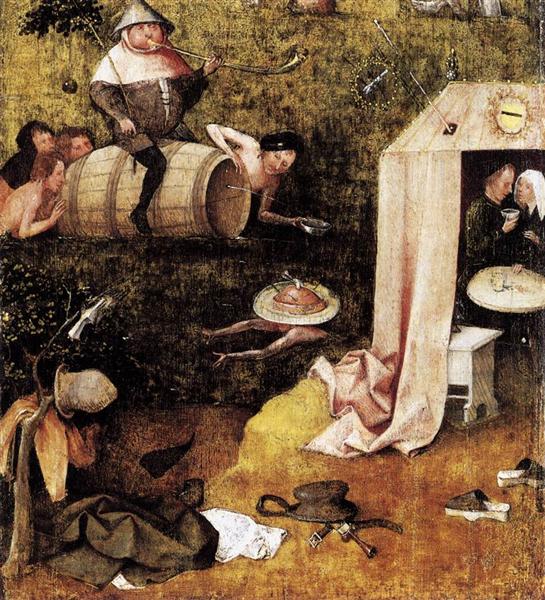
So in fact, a sanction was given not to just build capitalism in general, but to rapidly construct a criminal capitalism. Which was built! Which, after taking form, had absolutely no desire to part ways with its criminality, and which will never part ways with it! This was the worst possible way to build capitalism in Russia. I for one think that building capitalism in Russia is, in general, a rather hopeless task. If this capitalism gave up all of its positions in 1917, in February, when it was composed of, indeed, not the worst of people, honest people who donated to the arts, to science, and so on; if it then could not survive politically, then this begs the question of to what degree Russia and capitalism are compatible at all. Questions also exist as to what kind of future capitalism has globally. There are very many questions; we are approaching the end of the era of classical capitalism or the era of Modernity, and this is also clear…
Either way, the worst possible way to build capitalism was the one our people selected. This one specifically! Because they wanted quick results! Like in the line from “Station for Two” [a 1983 Soviet romantic comedy by Eldar Ryazanov – translator’s note] “Quickly, quickly, do it yourself!”
And so, they created a giant-toothed beast called “our capitalism”. The beast first, or simultaneously, whichever you prefer, ate everything which before was consumed by the fraternal countries, or Y. Then it ate everything which before the army and the military-industrial complex consumed, or Z. Then it shifted its focus to the X which the population retained. And, it started scarfing down that meager Soviet X! It ate so that only 0.8X was left, then 0.7, then 0.5… And it will scarf it down to the bone! This beast will eat the people down to the bone. For he who sold his birthright, will receive no lentil pottage! Those who seduced him to give up his birthright will eat the lentil pottage. This, to me, is where lies the dialectics of what is unfolding. This is where lies the second part of the mystery of the fall.
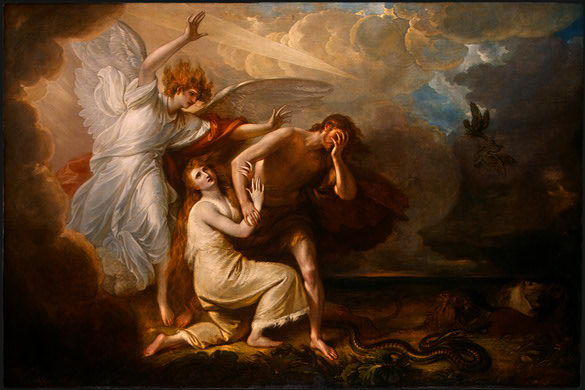
The people reached the final understanding, that they are being eaten to the bone, literally just now. I do not know why it took them so long to comprehend this. Perhaps they thought in the beginning that is all due to the fact that this is some sort of transitional period, and things will become better in the future. Perhaps it seemed to them afterwards that they have such a bad leader and such a bad government. Leaders are not the problem. Furthermore, the endless discussion about leaders is a difficult and hopeless undertaking, because the topic of discussion in this situation is a class, a support base, a macro-social pseudo-actor, which does all of this, and which sends forth one set of proteges or another. These proteges find themselves in a most complex of positions; since on one hand, they are still forced to at least somehow heed the popular opinion; otherwise, they would be the ones to be personally torn into pieces, not some abstract macro-social actor or the class as a whole! On the other hand, they are forced to wholly rely on this class and to articulate its interests.
And so, the question is about the quality of this class. It has produced nothing. Nothing at all! This does not mean that all of these people, who now hoard billions, do not offer some sort of goods to the market. Thy do offer them. The same things which were created in the Soviet Union. The same oil, the same aluminum, and so on. In the same quantities. They somehow made factories work, fixing them up a bit. But they did not create any new super-pure and super-sturdy materials, nor any new machines from these materials, nor any sort of new microchips, nor any sort of super high-end programming products; they did not do any of this. Just like they did not create any qualitatively new industrial production centers. There is nothing. People say that before we had bad airplanes, bad automobiles, bad train cars with bad locomotives. But now we have nothing, except for what gets purchased for oil and other raw materials. Just nothing!
In this lies the essence of this class! This is its nature; this is its inalienable social ontology. This is how it originated, this is what it is programmed for, and in essence, this is what it is. When did the people realize that they were being eaten to the bone? They realized this based on the reality which took form. In essence, it is no scarier now than it was before. The difference is that it has now fully taken form, and we can see how relentlessly it is moving in a well-defined direction, in this one and in no other. The people understood with their own skin, that they have really started being eaten alive.
Many times, I have asked the same question to my friends who lead the most humble existence, who are limited in their means because they have large families and small salaries, and thus have to be frugal. I asked them: how much does a healthy, strong, normal middle-aged man need in order to be able to eat three meals a day at home with everything necessary: meat, vegetables, fruits, dairy, and everything else?
People give different numbers. Some say 300 rubles, some say 400, and others say 500 rubles per day. Okay, let’s take the median number, let’s say 400. It’s fine if I’m mistaken, even though this isn’t hard to calculate, and everyone can do this themselves. Multiply this by 30 days, and you get 12,000 rubles. Next come utilities payments which constantly go up, transportation, obligate expenditures. You have to wash your clothes, buy laundry detergent, buy a washing machine, if it breaks down; do you not have to somehow do all of these things?
It gradually turns out according to these calculations, that the most meager average lifestyle (not an impoverished one, but a gloomily acceptable lifestyle) in terms of food, clothing, and public transportation all amounts to somewhere around 20-25 thousand rubles in Moscow. This means that everyone who makes less have already lost irreversibly! Irreversibly, once and for all, compared to the Soviet X, because their salary is less than what X was, which amounted to 200 Soviet-era rubles. And there are people whose salaries are even smaller.
Furthermore, imagine if this person has children. Then imagine he needs… let’s not say he needs a complex operation; he just needs a hole drilled in his tooth. He has to have some recreation – oh the horror! Or imagine he needs to provide an education for his children. Then he has suffered a total defeat! And, he understands this. Meanwhile, he has one more problem, which is impossible to solve in this situation. The problem of housing.
I have a good friend who faithfully and despite all of the hardships and adversities served in the army. He ended up reaching a high position; he worked in the General Staff, but he still lived in a rented communal apartment. Finally, becoming fed up with the fact that despite his abilities (he finished graduate school and earned a PhD in Philosophy at Moscow State University), not only can he not achieve self-actualization, but he can’t even honestly serve (for reasons that everyone understands), he left to work for a very big business group, and he received a very high salary. Being a well-organized and frugal person, he began to save up, and he finally managed to buy himself a one-bedroom apartment, which made him very happy.
He and his wife have two children. After a while, his son got married and brought his wife to the apartment, and his daughter brought her husband. They had children. Now there were three families in a one-bedroom apartment. Now my friend has to buy two apartments, even cheap ones, for his son and daughter. For this, he needs a sum greater than half a million dollars, which this person will never make.
This means that it wasn’t 90% of the population who lost, but 95%, or possibly more. Where then is the group which won in terms of lentil pottage? It is very small.
In order to make a restoration impossible, any revolution does a few very simple things. It gives the people something, which the people will then never agree to give up. The Great French Revolution gave land to the peasants and the Napoleonic Code, i.e. certain rights which broke the barriers of the estates. No matter who came to power after Napoleon’s exile to Elba and then to Saint Helena, no matter the degree to which these were restorationist forces, they could not take this back, because they understood that the people would never give this up… The Revolution of 1917 also gave something, and it also closed the door for restoration in a certain fashion.
Now I want to ask: what has the last Russian social transformation given, even in terms of lentil pottage? What? They say that it gave the right to travel abroad. To whom? On “Judgment of Time”, we had a teacher from Tomsk as a guest. Her monthly salary is 8000 rubles. Eight thousand! She can’t even travel to Omsk [an adjacent Siberian city – translator’s note] from Tomsk. When she was invited to Moscow, the trip seemed like out of a dream to her, an absolutely fantastic opportunity. She can travel abroad? To Paris? To the Louvre? Stop making people laugh! Who are you talking about? About yourselves? How many such people are there? I am able to travel around the world, and I do travel around the world, but I belong to roughly 3% of our fellow citizens, who have absolutely no right to speak on behalf of others.
What else did these people receive? What? Open social prospects? Of what sort? What did the scientists, the engineers, the educators get? These are people who in any country of the world, including Egypt or even Angola, still live better than the rest. Did they attain happiness, these groups who carried this perestroika on their shoulders? They attained the “happiness” of living worse than the rest! Worse by definition! And, they know about this. They took the blow.
And after this, we speak of modernization? We will create separate sites while knowing full well, that we have underfunded science, education, and the engineering complex by 10-12 times? What are we talking about? About what benefits? For whom? For people who before could at least travel around the country, but now they can’t even travel from Tomsk to Moscow? For whom?
People are gradually becoming aware of this. This awareness breeds dissatisfaction. One which is very soft, limp, helpless, but widespread! This dissatisfaction is of a purely social nature. It has to do with one thing that is clear: compared to the Soviet X they got less, and they will get even less than before. It now becomes clear what ought to be discussed scientifically, but some other time: what were social consumption funds? How much did a Soviet person really get from these social consumption funds? My calculations could be imprecise, and I know that they will deeply perturb many, but I have counted that a Soviet person received no less that $3000 a month in today’s money from these social consumption funds. Can one do without these funds? In a manner of speaking, one can. Then give people this, instead of inventing some mythical “living wage”, which closely resembles numbers from Auschwitz. People are supposed to survive on some 5000 rubles a month. It is absolutely unclear what they’re supposed to eat, how they’re supposed to procreate, and how they’re supposed to pay for their expenditures.
The social consumption funds were socialism. It was real, living, rough, and clumsy, but it existed. The Soviet enterprise, which everybody liked to talk about and to criticize in every way possible, was not just an enterprise. It had health spas, sanatoriums, summer camps for children, affiliated state farms, and it built housing. It was a complex social organism. This organism resisted through all of the ‘90s, as it was being destroyed. Throughout the ‘90s, the “Red directors” who had already started down the path of privatization, had the greatest fear that the social infrastructure would be lost. They tried to preserve it at all costs. As soon as it disappears, what does the budget mean? The budget doesn’t mean anything.
What matters is not the domain of the budget, but the giant industrial domain which spanned the entire country. The country had a certain material way of life. Of course, I identify not so much with the material way of life but with something different. I, for example, held the Soviet asceticism in the highest regard. I never understood why there has to be an unlimited quantity of different rags and why they have to come in some insane variety of styles and variants, why stores have to always be busting at the seams from all of this junk. So, there is a few suits, three or four coats, and that’s enough. You don’t like them? Go to a tailor. Sure, it will be a little bit more expensive, but only a little bit.
I liked that in the neighborhood of Chernyshevsky Street, where I lived, there were four movie theaters, and in each one different movies would be playing; and as a matter of fact, they would be far from bad. Sure, there were less cafes there than now, but I never understood why everything needs to be turned into a place where someone is constantly chewing. Chewing and buying, chewing and buying. How could everything become so “lentilized”?! I don’t like it, but I don’t want to force my views on the rest of my compatriots. It is the shrinking amount of “lentils” which the compatriots are reacting to.
But! Before this, the compatriots sold their birthright, and someone who has sold his birthright is broken! A broken man cannot fight for his material well-being, just like he can’t fight for anything else. He is broken, and thus incapacitated. From this arises the great paralysis of social action. Alexander Nikolayevich Yakovlev, who spoke of a broken spine, knew his metaphors. He picked a very precise metaphor. A being with a broken spine cannot defend itself against an attack with its hand clenched in a fist. It can barely move, maybe it can’t move at all. Maybe it just grunts, “Mmmmeeeh, mmeeh, meh!” This being says “I don’t want this!”
But this is clearly not enough to make the irreversible reversible. Each of you can see this mystery unfold twice a day, in the morning and in the evening, when you squeeze toothpaste from the tube. It is very easy to squeeze out, but you can’t put it back in.
Most importantly, though, as long as we avoid discussing the problem of the birthright, all of the indignation about the shrinking quantity of lentils isn’t worth a plugged nickel.
On one hand, it is a vivid and terrifying tragedy for the vast majority of our compatriots. It is a fomented social hell, into which they are being immersed.
On the other hand, the compatriots need to somehow recognize that they took part in this, that this entire transition took place at the height of Russian democracy, at the height of the freedom of expression of the collective will. Sure, the majority voted to preserve the Soviet Union, but the Soviet Union was destroyed. There was, however, the opportunity to come out and protest against this destruction! And, no one would have immediately thrown anyone into black prison vans. Or not? Or it isn’t so?
Let us then discuss in greater detail the most important question, the question of the birthright, which the historical actor, which we love so much, gave up so easily. This historical actor is our country, our society, our people. If we do not discuss this question, we will not find any way out.

Source (for copy): https://eu.eot.su/2017/03/10/essence-of-time-chapter-1/
Essence of Time: The philosophical justification of Russia’s Messianic Claims in the 21st century
Sergey Kurginyan
Experimental Creative Centre International Public Foundation
Essence of Time is a video lecture series by Sergey Kurginyan: a political and social leader, theater director, philosopher, political scientist, and head of the Experimental Creative Centre International Public Foundation. These lectures were broadcast from February to November 2011 on the websites, www.kurginyan.ru and www.eot.su .
With its intellectual depth and acuity, with its emotional charge, and with the powerful mark of the author’s personality, this unusual lecture series aroused great interest in its audience. It served at the same time as both the “starting push” and the conceptual basis around which the virtual club of Dr. Kurginyan’s supporters, Essence of Time, was formed.
The book Essence of Time contains the transcriptions of all 41 lectures in the series. Each one of them contains Sergey Kurginyan’s thoughts about the essence of our time, about its metaphysics, its dialectics, and their reflection in the key aspects of relevant Russian and global politics. The central theme of the series is the search for paths and mechanisms to get out of the systemic and global dead end of all humanity in all of its dimensions: from the metaphysical to the gnoseological, ethical, and anthropological. And as a result, out of the sociopolitical, technological, and economical dead end.
In outlining the contours of this dead end and in stressing the necessity of understanding the entire depth, complexity, and tragedy of the accumulating problems, the author proves that it is indeed Russia, thanks to the unusual aspects of its historical fate, which still has a chance to find a way out of this dead end, and to present it to the world. But, realizing this chance is possible only if this becomes the supreme meaning of life and action for a “critical mass” of active people who have in common a deep understanding of the problems at hand.
Dr. Kurginyan’s ideas found a response, and the Essence of Time virtual club is growing into a wide Essence of Time social movement. In front of our very eyes, it is becoming a real political force.
We encourage republishing of our translations and articles, but ONLY with mentioning the original article page at eu.eot.su (link above).

